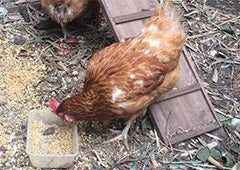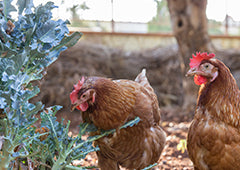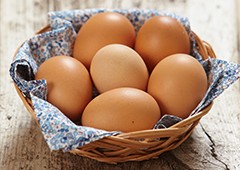The debate of whether to store your eggs in the fridge or in room temperature seems as old as existence of the humble egg itself! In Australia, it seems different supermarkets vary as to where the eggs are kept - sometimes you’ll find eggs for sale in the refrigerator, other times they are sitting on the shelf next to the oil or flour.
Did you know that different parts of the world such as the UK and America also store their eggs differently?! Seems strange, but the decision on where the eggs are stored come down to one factor - salmonella. Different countries have varying policies and regulations regarding how salmonella should be prevented in the eggs, which ultimately dictates whether they keep them on the shelf, or in the fridge!
Here’s a look at the ways America and the UK store their eggs and why they store them that way, as well as the regulations and practices in the Australian egg industry.
1. In America
What they do:
Refrigerate
Why:
American factory farms don’t specifically vaccinate or protect their hens from salmonella - instead they wash, dry and spray a small amount of chlorine on to get rid of infection outside the egg. However this strips them of their protective coating, which is said to actually put the inside of the eggs at a higher risk of infection - that’s why immediately after washing, they’re kept in cold conditions and refrigerated until sold.
There are approximately 140,000 cases of salmonella each year in America that are caused by contaminated eggs. Because of this, the Food and Drug Administration (FDA) enforces the rule that all eggs should be refrigerated, as being at room temperature can cause more bacteria to grow.
Because the FDA has realized the effectiveness of vaccinations as demonstrated by the UK, the FDA has encouraged factory farmers and egg producers to start vaccinating their hens, because of the proven successful results.
2. In the UK
What they do:
Room temperature
Why:
The supermarkets of the United Kingdom are perfectly happy keeping their eggs in room temperature on the shelves. This is because the hens that are used to produce commercially sold hens are all vaccinated against salmonella. By vaccinating every hens, the UK has all but eliminated the issue of salmonella contaminated eggs.
Unlike America, farmers in the UK do not wash their eggs. This is because washing the eggs strips them of their natural protective coating - therefore the eggs have stronger shells, and aren’t at major risk of contamination, allowing them to be stored on the shelf. Instead they rely on the vaccination and the clean conditions in which the chickens are kept to prevent contamination and illness.
3. In Australia
So - know we know about the US and the UK, but what about our own backyard? If you’ve wandered into Coles, Woolies or Aldi recently, you may have noticed that where the eggs are stored differ from shop to shop. Woolies seem to favour the fridge, whilst Aldi and Coles are perfectly happy having them on the shelf. Seems strange - here’s why:
What we do:
It varies according to supermarket and store. Some have their eggs refrigerated, others have them on the shelf at room temperature.
Why:
Australia’s egg situation is actually a bit all over the shop. Like the US, all eggs must be washed by hand or processor to prevent contamination on the outside of the egg. In addition, all broken or cracked eggs must be thrown out immediately.
However, unlike the US, there aren’t any specifications as to how to store the eggs. The decision as to whether the eggs are refrigerated or not is left up to the retailers selling them.
It seems the onus of keeping the eggs uncontaminated falls onto the factory farmers. Anything apart from having the eggs washed and processed seems to be optional.
We did a little digging to see what precautions the big egg companies take in Australia - it seems the majority of the chickens are un-vaccinated, however if a chicken becomes sick and a vet advises that they should be vaccinated against disease, then they are.
What should I do in my own kitchen?
The answer varies depending on where you live, your personal preferences and the temperature inside your house. A quick summary is:
If you live in warm temperatures:
-
If you go through eggs fairly slowly, then it might be best to keep your eggs in the fridge so they don’t spoil before you can use them! If you need them to be room temperature, just pop them out on the bench the night before (not in direct sunlight), and they’ll be ready to use the next day.
If you live in cold temperatures
-
If your kitchen is fairly cool in temperature, then you can successfully keep your eggs out of the fridge without them spoiling quickly. Still, make sure you keep them in a spot out of direct sunlight, where the temperature is fairly moderate.
For more information on where to keep your eggs, check out our ‘How Long Will My Eggs Last...’ article - brilliant advice if you're struggling with the difficult decision of choosing between fridge or shelf!


















